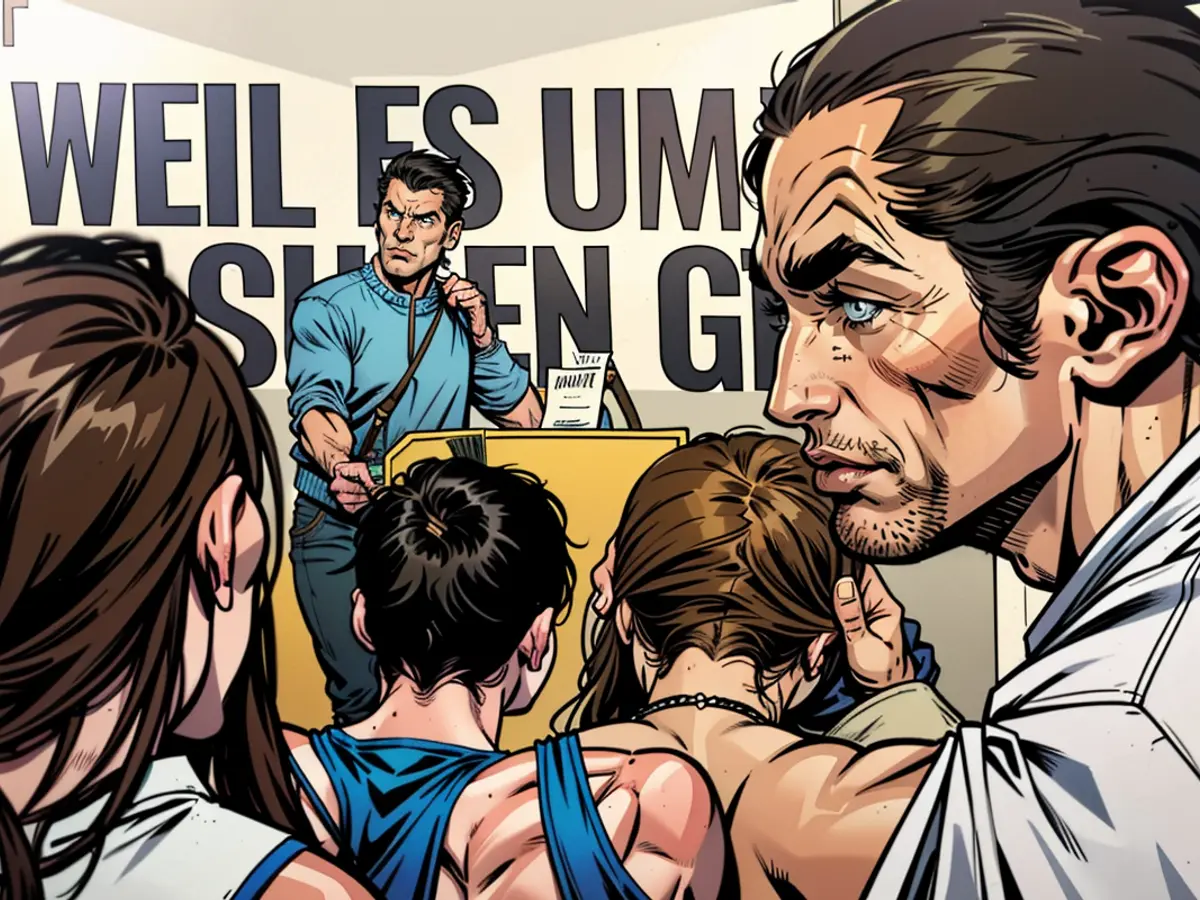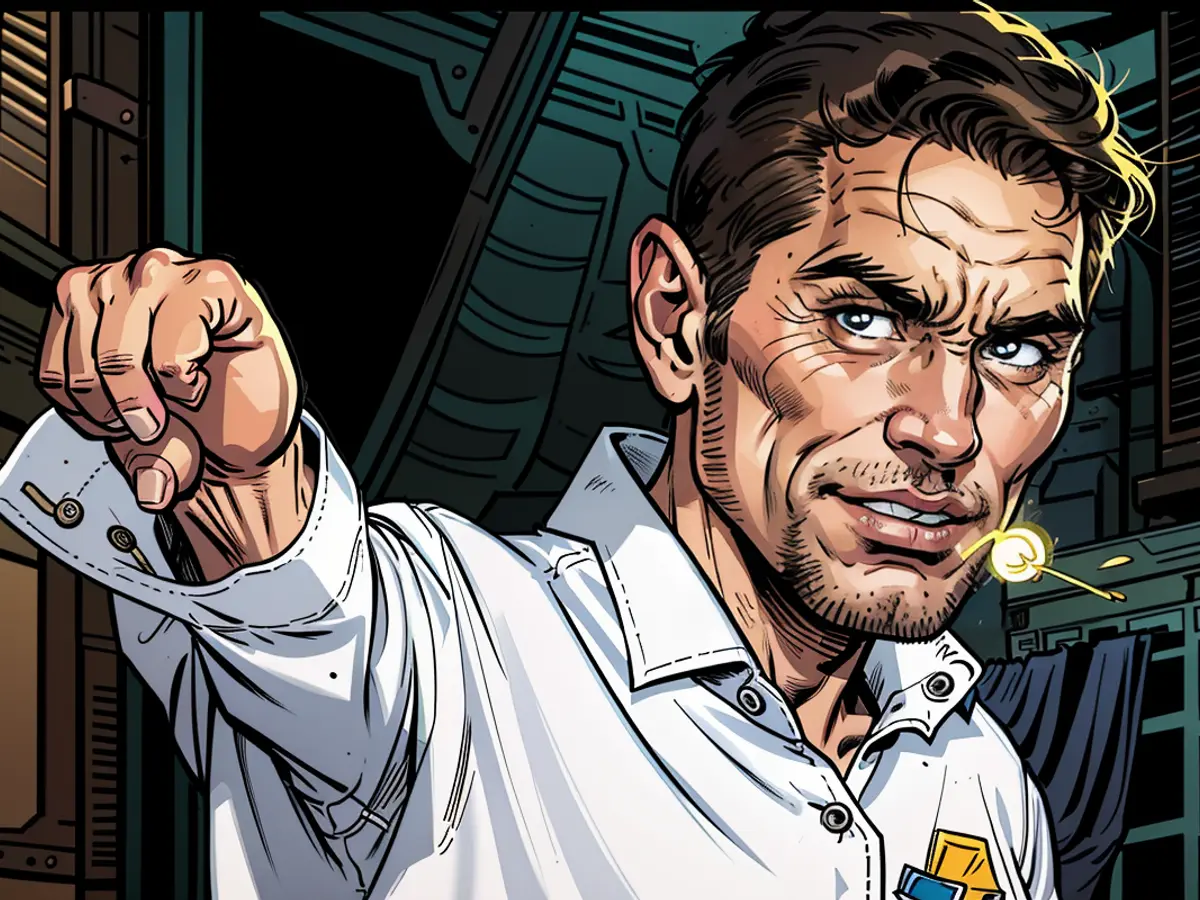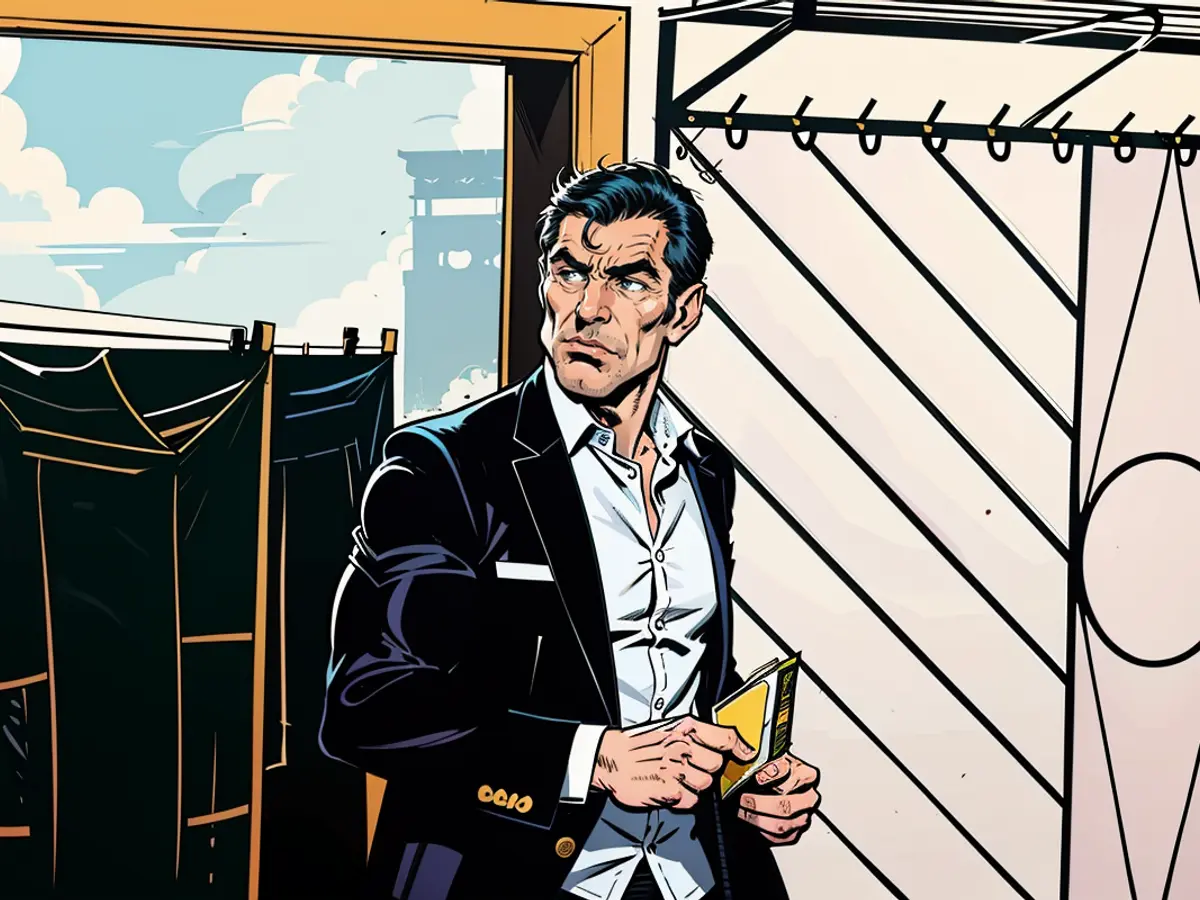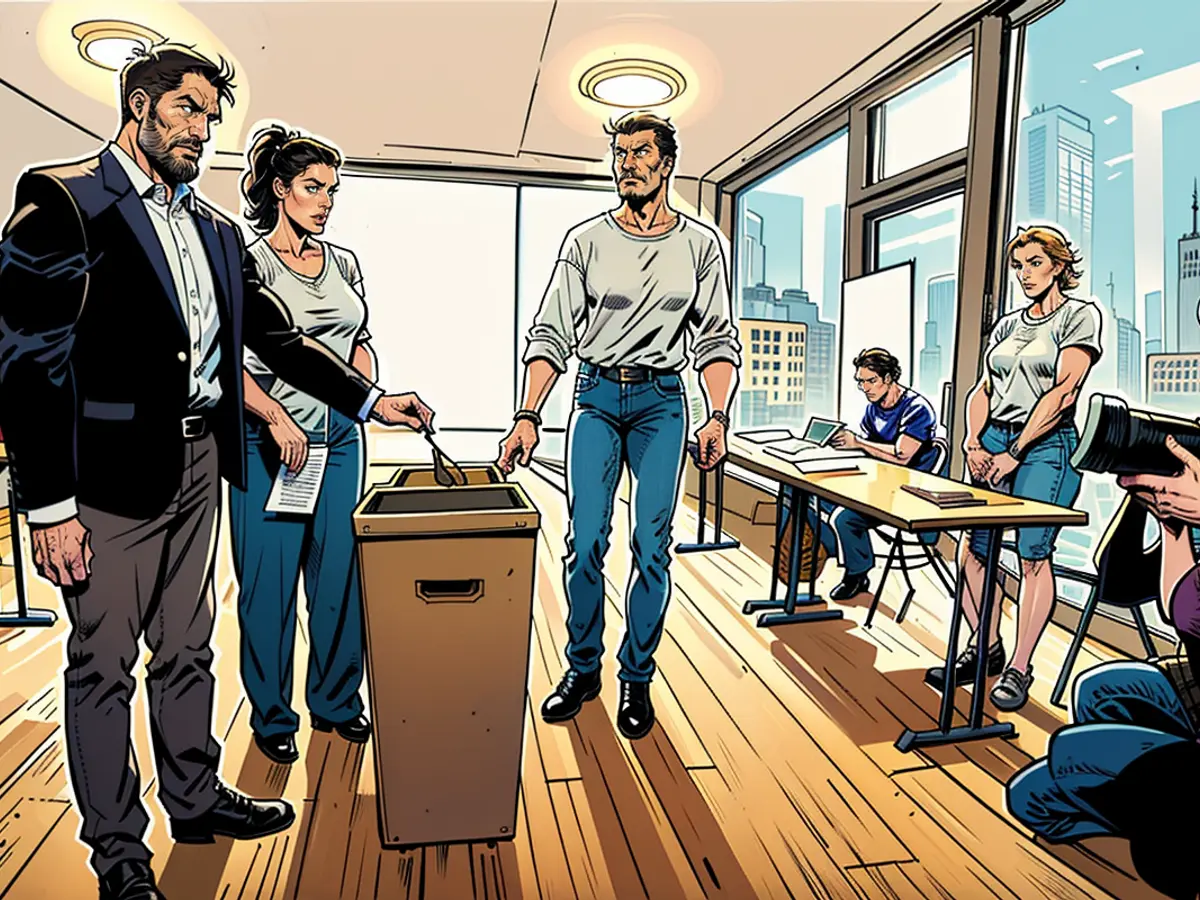At 19:26, Nouripour expresses his sentiments towards AfD's success: "My sympathies lie with those harboring fear"
19:13 Latest prediction for Saxony: CDU's edge weakensThe most recent projection from ZDF reveals the AfD closing in on the CDU: The Christian Democrats now lead with a minimal margin of 31.7%, barely beating the AfD at 31.4% of the votes. The BSW takes 11.4%, while the SPD falls short at 7.8%. The Greens are more securely in the state parliament with 5.5%, but the Left fails to meet the 5% threshold with 4.3%.
19:08 Wagenknecht aims for coalition with CDU and possibly SPD in ThuringiaLeader of the BSW, Sahra Wagenknecht, is hoping for a coalition with the CDU and potentially the SPD in Thuringia. "We genuinely hope to form a strong government with the CDU - likely also with the SPD," she said on ARD. After five years of a minority government, people are yearning for a stable majority government that can tackle pressing issues like "severe teaching shortages" in Thuringia, she emphasized. At the same time, people desire a state government that can make its voice heard on the national level - one that would, according to Wagenknecht, advocate for "peace, diplomacy," and oppose the placement of US missiles in Germany. She clearly rules out any coalition with the AfD in Thuringia.
19:02 Latest projection for Thuringia: AfD records further improvementThe recent ZDF projection for the Thuringia election results indicates the AfD performing even better than initially projected. According to this, the right-wing extremists are now reaching 33.1% of the votes in the federal state. The CDU drops to 24.3%, while Sahra Wagenknecht's alliance is at 15%. The Left, currently led by popular Minister President Bodo Ramelow, is losing about 8 percentage points and is now at 11.7%. The SPD is at 6.6%, and the Greens at 4% of the votes.
18:56 Göring-Eckardt views AfD's success as a 'democratic wake-up call' in GermanyMore than the Green Party's defeat in Thuringia, federal politicians are alarmed by the AfD's success in Thuringia. Katrin Göring-Eckardt, the Green Party's Bundestag vice-president, sees the success of the right-wing extremists as a "democratic wake-up call" in Germany. Party leader Omid Nouripour admits the party's disappointment over their failure, but views it as "minimal" given that the AfD is now the strongest force in a state parliament.
18:48 Kretschmer remains optimistic about Saxony: "We have every reason to celebrate"Saxon Minister President Michael Kretschmer views the CDU as a pillar of the government coalition. "We have every reason to celebrate," he said at his party's election celebration. "Behind us are five challenging years," the people of Saxony have trusted the CDU and stood against a so-called "protest vote." "We know how disappointed people are with what's happening in Berlin."

18:39 Initial prediction for Saxony: CDU's lead over AfD narrowsPreliminary projections from ZDF suggest the CDU's edge over the AfD is narrowing in the Saxony state election: The CDU now only has a slim lead with 31.9%, compared to the AfD's 31.3%. The BSW comes in at 11.6%, while the SPD falls short at 7.8%. The Greens barely make the state parliament with 5.2%, but the Left falls just short with 4.5%.
18:33 Weidel demands government participation for AfD in Thuringia and SaxonyAfD federal party leader Alice Weidel is demanding government participation for her party in Thuringia and Saxony. "Under normal circumstances, as often happens in this country, the strongest party, which is the AfD, begins exploratory talks," she says on ARD, referring to Thuringia. "The voter wants the AfD to be involved in the government. We have the support of 30% of the voters in both federal states, and without us, a stable government is simply not possible."
18:30 Kühnert acknowledges SPD's lackluster results in Thuringia and SaxonySPD secretary-general Kevin Kühnert acknowledges his party's modest results in the Thuringia and Saxony elections. "This is not a night to celebrate for the SPD," he said on ARD. He admits that his party has been battling difficulties for years. "There was a risk of being expelled from the state parliaments," said Kühnert. "Fighting is essential, we are needed." He emphasizes that changes are needed, such as more communication and listening to voters. When asked about Chancellor Olaf Scholz, he said, "We must explain our politics collectively."
18:23 Höcke celebrates Thuringia result as "historic victory"AfD parliamentary group leader Björn Höcke celebrates the Thuringia result as "historic." The AfD is now the strongest people's party in the federal state, "the ridiculous firewall nonsense must end," he said on MDR. He states that change will only occur with the AfD.

18:21 Chrupalla on Thuringia: Level with CDU AfD party leader Tino Chrupalla hails his party's performance in Thuringia as impressive, attributing it to a shift in voter sentiments in both states. Speaking on ZDF, he stated that the AfD is open to negotiations with all parties. In Saxony, Chrupalla mentioned, the AfD is virtually level with the CDU, and they aim to govern for the benefit of Saxony.
18:17 CDU secretary-general: No coalition with AfD in Thuringia or Saxony CDU secretary-general Carsten Linnemann has categorically refused any coalitions with the AfD in Thuringia or Saxony. He emphasized their stance, stating that they will be forming governments from the parliamentary center, expressing faith in the success of this strategy. Linnemann added that the CDU, as the final surviving people's party, acts as a barrier, and the traffic light parties have faced repercussions.
18:13 Projection for Saxony: CDU leading narrowly, BSW at 12%, Greens on edge The initial projection for the Saxony state election displays the CDU as the victor with 31.5% of the votes, narrowly surpassing the AfD at 30%. The BSW ranks third with 12%, while the SPD continues their presence in the state parliament with 8.5%. The Greens would barely meet the threshold of 5.5% to remain in the state parliament. The Left would be absent with 4%, and the FDP would fail to make the cut for the new parliament.
18:10 Projection for Thuringia: AfD leads, BSW gets 16% The preliminary report for the Thuringia state election highlights a significant lead for the AfD, gathering 30.5% of the votes, followed by the CDU at 24.5% and the Left at 12.5%. The SPD would participate in the state parliament with 7%, while the BSW would secure a seat with 16%. The Greens and the FDP would fall short of 5%.

18:01 AfD tops in Thuringia, BSW scores in double digits in Saxony As per the initial projection after the Thuringia state election, the AfD emerges as the clear front-runner, with the SPD crossing the 5% mark, while the Greens and FDP fall short. In Saxony, the BSW records a double-digit result. The CDU is just ahead of the AfD in the projections, while the Left and the FDP would not be represented in the state parliament as per predictions, but the Greens would continue to exist.
17:18 Höcke's seat uncertain in state parliament The future of AfD faction leader in Thuringia, Björn Höcke, remains uncertain in the state parliament. His competitive party colleagues could potentially cost him his seat. Several AfD candidates have good chances of securing a direct mandate, but Höcke faces strong competition from the CDU candidate, Christian Tischner, in his constituency of Greiz II. If Tischner wins and the AfD wins more direct mandates than they are entitled to based on the second vote results, no one can enter the state parliament via the state list, not even the first-position holder, Höcke. In this situation, the AfD could approach a successful direct candidate to renounce their state parliament seat, allowing Höcke to secure his.
16:48 AfD to avoid media coverage in Thuringia election party There is a high possibility that the AfD's Thuringia election celebration will not be covered by the media. Despite being categorized as right-wing extremist by the domestic intelligence agency, the party attempted to exclude several media outlets from the event. However, a court intervened, preventing the exclusion, causing the state party to then exclude the entire press, citing organizational issues due to limited space at the event location.
16:29 Quarter voted by mail in Saxony For the "critical election" in Saxony, as declared by its CDU Minister President Michael Kretschmer, around 24.6% of eligible voters have already cast their ballots by mail. The state election supervisor anticipates that 24.6% of voters will have voted by mail. The voter turnout is slightly higher than in 2019.

15:52 Höcke casts vote in Lada in Thuringia Thuringia's AfD state chairman and top candidate, Björn Höcke, aged 52, cast his vote at noon. He arrived at his polling station in Bornhagen, Eichsfeld district, in a Lada Niva, a Russian-made off-road vehicle.
Minister President Bodo Ramelow, aged 68, voted in the state capital of Erfurt, accompanied by his wife, Germana Alberti vom Hofe. He has led a minority government since 2014.
15:40 Voters Turning Out More Than Previous ElectionIn Thuringia, 44.4% of voters had voted by 2:00 PM, a 2.2% increase from the last election held five years ago. This trend suggests a high turnout, with absentee votes not yet calculated, according to the state election commissioner. In Saxony, turnout was 35.4% by midday, slightly higher than in 2019, but absentee votes are expected to be higher than in the previous year. Polls in both states close at 6:00 PM.
15:13 Electoral Hopefulness from Kretschmer

14:40 Concerns Beyond Migration for Saxony and ThuringiaA large survey reveals that approximately one-third of voters in Saxony and Thuringia plan to vote for the AfD in the upcoming elections. The survey reveals the primary concerns and issues, with immigration being just one of them.
14:13 Höcke Exits Polling Station swiftlyAfD's top candidate in Thuringia, Björn Höcke, cast his vote around noon but left the Bornhagen polling station quickly without speaking to journalists. Having lost to the CDU candidate in his home district of Eichsfeld, Höcke switched to the Greiz constituency, where he also faces a likely defeat against the CDU.
13:50 Voter Turnout in Thuringia Resembles 2019In Thuringia, voter turnout matches the previous parliamentary election. By 12:00 PM, around 32% of eligible voters had cast their ballots, excluding absentee votes. In 2019, the turnout was 31.2% at the same time. There is also increased interest in the state election compared to the recent European and local elections, where turnout was 24.3% at the same time.
13:29 Anticipated High Voter Turnout in SaxonyIn Saxony, voter turnout is expected to be high, with 25.8% of eligible voters casting their ballots by midday, according to the Statistical State Office in Kamenz. In 2019, the turnout was 26.2% at the same time. Absentee votes are not yet included in the preliminary numbers, but it is expected that 24.6% of eligible voters will vote by mail, compared to 16.9% in 2019. The elections are proceeding smoothly without any disruptions, according to the state election commission.

13:11 Lucke: SPD's Absence Could Impact Berlin CoalitionThe result of the state elections in Saxony and Thuringia is still pending. If the SPD does not make it into the state parliament, political scientist Albrecht von Lucke says this would "almost be an earthquake." In an ntv interview, he analyzes the election and its potential consequences.
12:44 Police Investigating Polling Station ThreatFollowing an incident at a polling station in Gera, police are investigating a threat. A man wearing an AfD T-shirt entered the polling station in the morning to cast his vote, according to a police spokesperson. The polling station manager asked the man to remove the shirt as it was prohibited party advertising. Although the man complied, he threatened to "come back" as he was dissatisfied with how he was treated when leaving the polling station. Police then filed a report and reprimanded the man. Additionally, police in Erfurt are investigating political graffiti ("Höcke is a Nazi") near polling stations as criminal damage.
12:15 Correctiv Warns of Circulating False InformationThe research network Correctiv is warning about an old false report that is circulating once again. It claims that signing the ballot paper protects against election fraud. However, the Federal Returning Officer's office confirmed to Correctiv: "The ballot paper must not be signed. Signing the ballot paper by the voter endangers the secrecy of the vote, making the entire ballot paper invalid."
11:51Voigt Wishes for "Stable Majority Relations"Thuringia's CDU top candidate Mario Voigt has also cast his vote. He wishes "that many Thuringians exercise their right to determine the future of our country" and hopes for "stable majority relations" to move the country forward.

11:25 Sonneberg Experiences Increased Far-Right AttacksSonneberg is the first district in Germany to be led by an AfD politician. Since then, activists have reportedly been threatened, leading many to quit their jobs. The number of far-right attacks has also reportedly increased fivefold in a year. Experts see a connection to the AfD district administrator.
10:57 Kretschmer Addresses the Polling StationSaxony's Minister-President Michael Kretschmer calls the state election "probably the most important election in 34 years." He says he is grateful to many people who "voted differently in recent years" but have now decided for the "strong force in the bourgeois center," namely the Saxon Union. "This understanding will enable us to form a government that serves this land," Kretschmer continues. In recent polls, his CDU is in a tight race with the AfD.
10:30 Ramelow: Wagenknecht "Is Not Running"For Thuringia's Minister-President Bodo Ramelow, election day is "a festival of democracy" - even if there's a chance he won't be re-elected. In an ntv interview, the Left Party politician explains why he doesn't recommend a minority government and why he doubts the competence of the BSW.
09:59 "Historically Insensitive Election": Historian Expresses Concern Over Election DateHistorian Peter Oliver Loew voices concerns over the election date for the state elections in Saxony and Thuringia, which coincides with the 85th anniversary of the German invasion of Poland in 1939. Loew, director of the German Polish Institute, commented to Redaktionsnetz Deutschland (RND), "Anyone who thought holding elections on September 1st was a good idea had a strange feeling for history." Loew raises concerns about the far-right Alternative for Germany (AfD), classified as "securely right-wing extremist" by the domestic intelligence service in both states, especially if it gains power in Dresden and Erfurt, as it may have questionable connections to Nazi era.

09:30 "Crucial Voting Day": All Information for Saxony's State ElectionApproximately 3.3 million eligible voters in Saxony have the opportunity today to influence who will shape the political direction of the Dresden state parliament moving forward. The Christian Democratic Union (CDU) may lose its position as the most powerful party in the state for the first time since 1990. Saxony's Minister President Michael Kretschmer calls this election "crucial." "Everything is at stake."
09:05 Kretschmer Accuses Coalition of "Frantic Panic Before Election"Today is election day in Saxony, and the question remains: Will Minister President Michael Kretschmer continue the CDU's successful streak in the state? During an interview on ntv, Kretschmer discusses his stance on the refugee debate, the traffic light government, and the Ukraine war.
08:46 All Data for the Election in ThuringiaDecision day has arrived: Governing the central German federal state with its 2.1 million residents for the next five years is up for grabs. Will the far-right Alternative for Germany (AfD) with leader Björn Höcke become the most powerful party in Thuringia?
08:24 Potential Threat to Democracy from the AfD's Growing InfluencePolls indicate: The far-right Alternative for Germany (AfD) is likely to enhance its influence in the upcoming elections in Saxony and Thuringia. This is dangerous for democratic institutions, as a research group has highlighted. While the rule of law may appear robust, it is not as strong as many believe.
08:00 Polling Stations Now Open in Thuringia and SaxonyNew state parliaments will be elected today in Thuringia and Saxony. In the polls, the far-right AfD is leading in Thuringia. In Saxony, the CDU of Prime Minister Michael Kretschmer and the AfD are in a close race. Preliminary results are expected to be announced with the closing of the polling stations at 6 pm. The elections in the two eastern German states serve as a barometer for the traffic light coalition in Berlin.
For the current red-red-green coalition led by Minister President Bodo Ramelow (Left) in Thuringia, there is no majority forecast in the polls. A coalition comprising the CDU, Sahra Wagenknecht's (BSW) alliance, and the SPD is a possibility after the election. It remains unclear whether the current coalition of the CDU, SPD, and Greens in Saxony will still have a majority. Kretschmer does not rule out a BSW alliance. The Left risks being excluded from the parliament in Saxony, while the same fate may befall the Greens and FDP in Thuringia.
In the context of the Thuringia election, Sahra Wagenknecht discarded the idea of a coalition with the AfD, stating, "We genuinely hope to form a strong government with the CDU, likely also with the SPD."
In the projected results for Saxony, the Left party failed to meet the 5% threshold, with only 4.3% of the votes.








